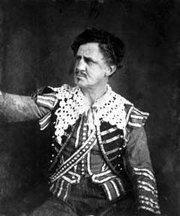Junius Brutus Booth
|
|
Junius Brutus Booth (May 1, 1796–November 30, 1852) was an actor and father of John Wilkes and Edwin Booth.
Born in London, Booth displayed remarkable talent from an early age, deciding on a career in the theatre by the age of seventeen. He performed roles in several small theatres throughout England, and joined a tour of the Low Countries in 1814, returning the following year to make his London debut.
Booth gained national renown with his performance in the title role of Richard III in 1817 at the Covent Garden Theatre. Critics compared his performance favorably with those of Edmund Kean, who was at that time the foremost tragedian in Britain. Indeed, partisans of these two actors would occasionally start rows at venues where the two were playing together. This did not however stop the two from performing in the same plays; Kean and Booth acted in several Shakespearian productions at the Drury Lane Theatre from 1817 to 1821.
Booth emigrated to the United States in 1821, settling near Bel Air, Maryland on a farm he called "Tudor Hall." He then embarked upon a thirty-year acting career that made him famous throughout the country. Booth traveled to such cities as Baltimore, Boston and New York; he was particularly acclaimed in New Orleans due to his ability to perform in French.
In 1825-1826 and 1836-1837 Booth made tours of his native England. By 1831 he had become the manager of the Adelphi Theatre in Baltimore. His acclaim continued to grow throughout the rest of his life; Walt Whitman described him as "the grandest historian of modern times." However, his marriage was a troubled one, and he suffered the loss of two children. This led to problems with alcohol and had a detrimental affect on his health, which declined steadily through his later years.
Throughout the year of 1852 he was involved in a tour of California with his son Edwin, performing in San Francisco and Sacramento. On the return trip the pair again visited New Orleans for some engagements. Here the elder Booth was taken ill, and died on a steamboat while returning to Bel Air.

